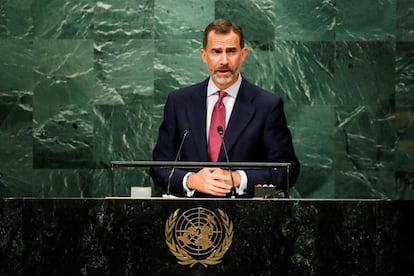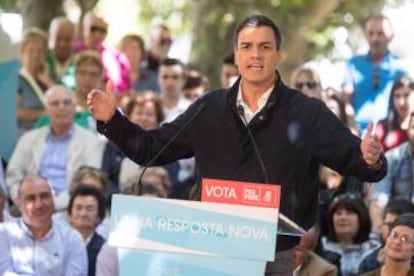Spanish king’s UN speech provides political ammunition back home
PP conservatives say Socialists should feel particularly targeted by Felipe VI’s request for dialogue
Spain’s Popular Party (PP), which has been heading a caretaker government since December, on Wednesday used King Felipe VI’s speech at the United Nations General Assembly as ammunition against the main opposition Socialists.

In his Tuesday address in New York, the monarch had sought to allay international concerns about the prolonged lack of government in Spain, offering the assurance that Spanish politicians will overcome “the complex context” through “dialogue,” “commitment” and “a sense of duty.”
A day later, acting Prime Minister Mariano Rajoy said that he shared the king’s view on the need for political dialogue to avoid a potential third national election on Christmas Day.
In the end, a political problem is going to become a jobs problem and a social problem
PP congressional speaker Rafael Hernando
Campaigning on his home turf of Galicia ahead of regional elections there this coming Sunday, Rajoy said that “Spain needs to be offered a way out.”
Rajoy then laid responsibility for the stalemate at the door of Socialist Party (PSOE) leader Pedro Sánchez, who voted against the former’s reinstatement at a recent investiture session in Congress. “I tried, but it did not go well,” Rajoy said about that vote.
Following the first elections in December, Sánchez had made a bid of his own for the prime minister’s office, but was voted down by Rajoy’s party.
In between shows of support for Galician premier Alberto Núñez Feijóo, who stands a good chance of winning a third term in office, Rajoy noted that Spain’s legislative activity has been at a standstill for the last nine months. Bills cannot be brought to the floor for debate, and the 2017 budget cannot be approved – which in turn means missing EU deadlines and running the risk of sanctions.

The PP speaker in Congress, Rafael Hernando, echoed Rajoy’s thoughts.
“What the king did was to voice the majority opinion among Spaniards: that Spain deserves a government,” he said on Wednesday. “Some people should realize that the situation they are taking the country toward is absurd and enormously detrimental to citizens as a whole. In the end, a political problem is going to become a jobs problem, and thus a social problem.”
Hernando blamed Sánchez for the impasse, and said there will be an economic price to pay because the political uncertainty is keeping investors away.
Meanwhile, the PP candidate to the premiership in the Basque Country, which is also holding elections this Sunday, said that while all Spanish politicians should heed the king’s words, it is Sánchez who should be listening most closely.
“Sánchez is chiefly responsible for the deadlock because he is stuck with his ‘no,’ he won’t budge from that position yet he has no alternative to offer, leading to the deadlock,” said Alfonso Alonso, whose chances of winning the Basque elections on Sunday are next to none.
English version by Susana Urra.
Tu suscripción se está usando en otro dispositivo
¿Quieres añadir otro usuario a tu suscripción?
Si continúas leyendo en este dispositivo, no se podrá leer en el otro.
FlechaTu suscripción se está usando en otro dispositivo y solo puedes acceder a EL PAÍS desde un dispositivo a la vez.
Si quieres compartir tu cuenta, cambia tu suscripción a la modalidad Premium, así podrás añadir otro usuario. Cada uno accederá con su propia cuenta de email, lo que os permitirá personalizar vuestra experiencia en EL PAÍS.
¿Tienes una suscripción de empresa? Accede aquí para contratar más cuentas.
En el caso de no saber quién está usando tu cuenta, te recomendamos cambiar tu contraseña aquí.
Si decides continuar compartiendo tu cuenta, este mensaje se mostrará en tu dispositivo y en el de la otra persona que está usando tu cuenta de forma indefinida, afectando a tu experiencia de lectura. Puedes consultar aquí los términos y condiciones de la suscripción digital.









































